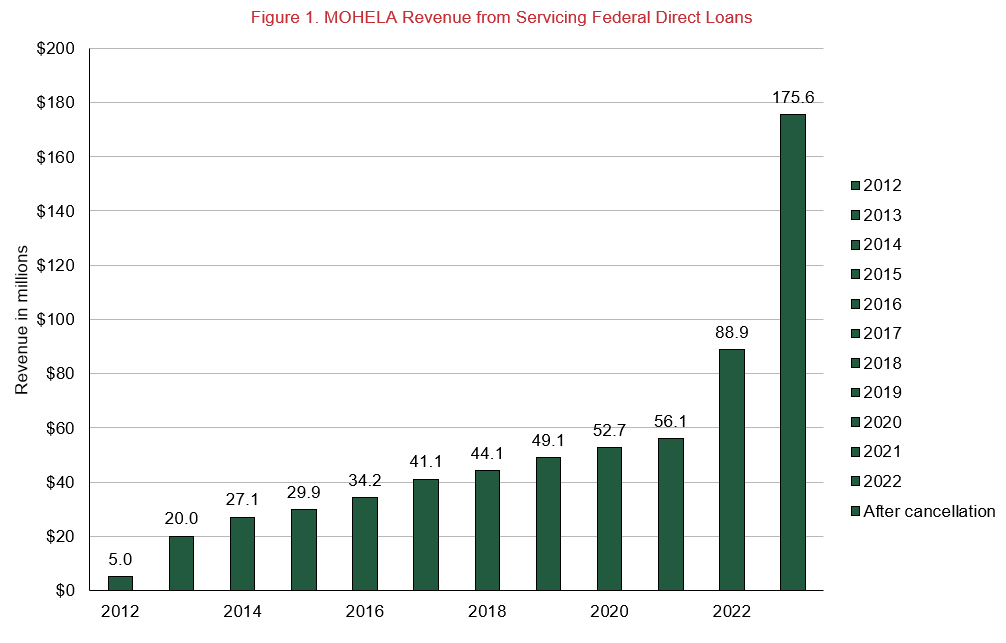Data Shows the Case against Student Debt Relief Is Even Weaker than Previously Understood
May 26, 2023
By Thomas Gokey, Eleni Schirmer, Braxton Brewington, and Louise Seamster
In a lawsuit currently before the Supreme Court, six Republican states’ attorneys general are suing to stop student debt cancellation for over 43 million borrowers. As we explained in a recent issue brief, the suit doesn’t add up; updated data obtained since that release shows that the argument makes even less sense.
The Republican attorneys general argued that cancellation would reduce the revenue of the student loan servicer MOHELA (the Higher Education Loan Authority of the State of Missouri), which would in turn make it more difficult for MOHELA to pay a debt it owed to Missouri (even though MOHELA hasn’t made a payment in 15 years and says it has no plans to make any payments in the future).
The plaintiffs cited MOHELA’s financial statements, which show that MOHELA made $88.9 million in revenue servicing 5.2 million federal direct loan accounts. They claim that since cancellation would eliminate all federal student loans for nearly half of all borrowers, “MOHELA is at risk of losing at least half of the Direct Loan accounts it services, which equates to millions of dollars of revenue per year.”
The debt relief lawsuit has hinged on this metric, presuming that MOHELA’s accounts are static and that after cancellation, MOHELA would have fewer accounts than it did prior to cancellation in 2022. However, as our issue brief showed, between the financial statement release and January 2023, MOHELA had actually gained another 2.2 million accounts, which would more than make up for any losses from cancellation. We found that even after Biden’s cancellation plan is fully implemented, MOHELA will have both more student loan accounts and more revenue than it did in the summer of 2022. Should Missouri finally demand a payment on a long-dormant debt, our assessments of MOHELA’s revenue suggest it would more than be able to repay, regardless of cancellation.
At the time we published our brief, we were basing our estimates on MOHELA’s account data from January 30, 2023. We have since obtained MOHELA’s account data from April 30, 2023, which shows that MOHELA now services 7,719,801 accounts (see Figure 2). This is an increase of 254,344 since January—an average of two new accounts every minute.
Based on this updated data, we estimate1 that, assuming cancellation is implemented, MOHELA will service 5.6 million accounts, generating $175.6 million in servicing fees annually for those accounts. This is nearly double its revenue in 2022.

Not only does this new information add more precision to our claim that MOHELA’s revenues continue to increase, it also underscores a fundamental point: As a government contractor, MOHELA is a dependent agency, utterly reliant upon the federal government for its business. MOHELA’s contract with the Department of Education gives the Department of Education full discretion to assign accounts to MOHELA—and increase its bottom line—and full discretion to remove accounts, decreasing revenue. MOHELA is disallowed from protesting these changes: As of its 2022 contract modification, MOHELA “agrees not to object to or protest” its account allocation and “further waives and releases all current and future claims” about such decisions. The account increase between January and April 2023 of this year shows this point: MOHELA’s revenues have increased only because the government assigned it more accounts.

In addition to the roughly 2 million accounts for which MOHELA will be paid to process full discharges, we estimate that there will be an additional 3.4 million accounts that will receive a partial discharge. That is, MOHELA will be paid both to reduce its accounts by either $10,000 or $20,000, and paid a servicing fee to continue servicing those accounts. This is one reason why cancellation is lucrative for servicers.
But the bottom line is: The plaintiffs are arguing to kill cancellation by saying that MOHELA will have fewer accounts and less revenue, thereby harming the state of Missouri with its inability to pay its debt. The facts are the opposite. After cancellation, MOHELA will have more accounts—and more money—than ever before.
If the Supreme Court follows the facts and the law, this case should be dismissed. The plaintiffs simply are not harmed and do not have standing to bring the lawsuit in the first place.
1 We make the following assumptions:
- 95 percent of borrowers meet the income requirements for Biden’s cancellation plan;
- 75 percent of the people who qualify will actually apply;
- 60 percent of borrowers received Pell Grants and qualify for the higher cancellation amount, up to $20,000; and
- Payments will resume according to plan on August 1, 2023. After payments resume, roughly 65 percent of the accounts MOHELA services will be considered “current,” and MOHELA will be paid $2.90 per month per account. The remaining 35 percent will be in some form of “in school,” “grace,” or “forbearance” status, and MOHELA will be paid $2 per month to service those accounts.